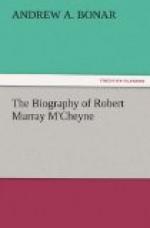They set out for England. Mr. Purves, Mr. Somerville of Anderston, Mr. Cumming of Dumbarney, and Mr. Bonar of Kelso, formed the company. Their chief station was Newcastle, where Mr. Burns had been recently laboring with some success, and where he had seen “a town giving itself up to utter ungodliness, a town where Satan’s trenches were deep and wide, his wall strong and high, his garrison great and fearless, and where all that man could do seemed but as arrows shot against a tower of brass.” But those who went knew that the Spirit of God was omnipotent, and that He could take the prey from the mighty.
They preached both in the open air, and in the places of worship belonging to the Presbyterians and to the Wesleyan Methodists. The defenders of the Sabbath cause were specially prepared to welcome Mr. M’Cheyne, whose tract on the Lord’s Day has been widely circulated and blessed. Many were attracted to hear; interesting congregations assembled in the market-place, and there is reason to believe many were impressed. A person in the town describes Mr. M’Cheyne’s last address as being peculiarly awakening. He preached in the open air, in a space of ground between the Cloth Market and St. Nicholas’ Church. Above a thousand souls were present, and the service continued till ten, without one person moving from the ground. The moon shone brightly, and the sky was spangled with stars. His subject was, “The Great White Throne” (Rev. 20:11). In concluding his address, he told them “that they would never meet again till they all met at the judgment-seat of Christ; but the glorious heavens over their heads, and the bright moon that shone upon them, and the old venerable church behind them, were his witnesses that he had set before them life and death.” Some will have cause to remember that night through eternity.[19]
[19] He afterwards preached
the same subject with equal
impressiveness in the
Meadows at Dundee. It was in the open air and
the rain fell heavy,
yet the dense crowd stood still to the last.




